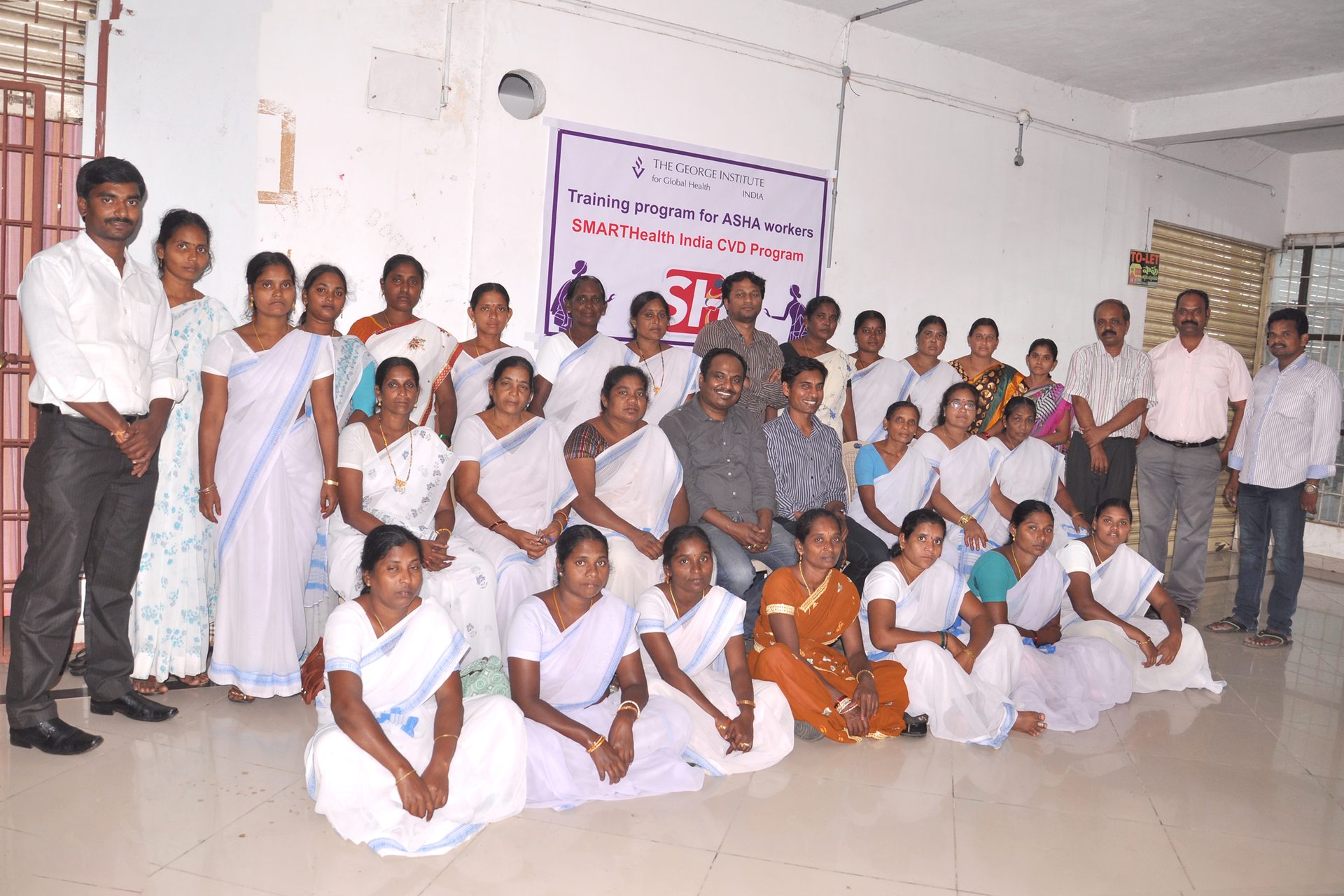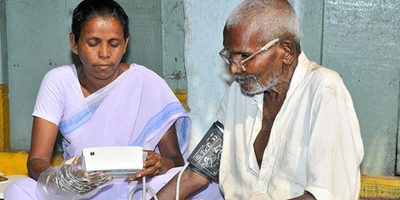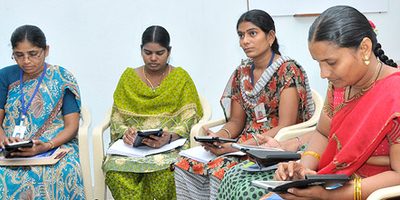
An innovative and smart way to fight chronic cardio-vascular disease launched
After the success of the pilot project that familiarized doctors and ASHA workers with a smartphone based clinical decision support system in 11 villages of West Godavari district, the George Institute for Global Health India, has launched a large-scale research project known as SMARTHealth India in 54 villages to bridge the implementation gap in blood pressure control in rural Andhra Pradesh.
The project which has been approved by the ethics committee and the Health Ministry screening committee will use the 'Health Tracker-India', an android-based app developed by the George Institute for Global Health in India with the support of Institute of Bio-Medical Engineering at Oxford University.
The app, which has been customized for use by non-physician health care workers in rural areas of the country, records blood pressure, cholesterol levels and other heart disease risk factors like age, sex and smoking status, and analyses the data to indicate extent of cardio-vascular disease (CVD) risk, based on which the person can consult a doctor for further treatment.
The app will now be used to provide an intervention that aims to demonstrate task-sharing between doctors and non-physician health care workers aimed at widening health care access to people in these villages.
The project kicked off last week with a training of 80 ASHA workers and six Primary Health Care doctors from the West Godavari district. Dr. David Peiris from George Institute for Global Heath Australia, led the training programme that follows a recently completed baseline study involving interviewers conducting a complete household survey and collecting data about the prevalence of cardio-vascular diseases for those who are above 40 years of age in 54 villages of the district.
“SMARTHealth is a low-cost, technology assisted, high-quality healthcare delivery system, providing the healthcare worker with personalized clinical decision support to guide the Systematic Medical Appraisal Referral and Treatment (SMART) of individual patients,’’ says Dr. Peiris, programme head, primary health care research, The George Institute.
“In the pilot, we involved 11 accredited social health activists (ASHA’s) in villages who are familiar with the neighbourhood and who went from door to door, assessing their medical condition using the app. Based on the report generated from the app, they referred patients to doctors or suggested precautionary measures. The pilot provided important insights and helped develop this intervention further." says Dr. Praveen, project lead, SMARTHealth India, adding that the research paper based on the findings of the pilot has been accepted for publication. “From next month onwards, ASHA workers will be starting screening high risk population connecting them to doctors in the PHC.’’
When the application was tested in 11 villages in the West Godavari district of the state, it not only tracked risk factors, but also addressed a mindset plaguing a large number of people - callousness towards health issues including even basic tests. “Before I was involved in the pilot, I did not know anything about diabetes or blood pressure control. Now I regularly get my blood pressure and sugar levels checked,’’ says Marthamma, an ASHA worker from Ardhavanam village who is keen to participate in the larger research project.
The project is funded by the National Health and Medical Research Council through a call from Global Alliance for Chronic Diseases. "The modalities of the large-scale research project have been worked out with support from the Directorate of Public Health and Family Welfare of the Andhra Pradesh Government and the screening and treatment of patients with high CVD risk will start from next month’’ informs Praveen.
“This is an important program on non-communicable diseases and we welcome this development as this research output will be useful in the scaling up of NCD programs throughout the state and the country,’’ says a spokesperson of the Directorate, which has issued a letter of support to the Institute in this regard. “This is a very useful programme and will definitely help tackle the growing CVD prevalence in our community,” suggested Dr Durga Prasad, a PHC medical officer from West Godavari district.
The app follows a few simple processes. One key feature of the app is that the BP device is bluetooth-enabled and transfers readings to the app, which then calculates CVD risk, recommending lifestyle changes and alerting the patient for follow-up. Patient summary is also stored using the app for future reference. The app not only alerts the person for CVD risk over a 10-year period, but also has a risk projection meter, which presents a visual portrayal of the CVD risk depending on change in values of risk factors over time.
"The app also has a section recording lifestyle habits like smoking, alcohol consumption, extent of physical exercise etc. Whenever the history of smoking for a person who is being screened is recorded, the needle of the 'risk-meter' dial moves in an area marked orange and an automatic prompt to advice the participant on healthy lifestyle changes including smoking cessation is generated," said Dr Kishor Mogulluru, Research Fellow from George Institute working on this programme, giving an example.
The way the app works, it will help save time of available doctors as the basic screening protocol has been conducted by the health worker, and the doctor does not have to conduct these basic health risks again, "The information from the app is automatically transmitted to a remote server and then to the doctor in the nearest primary health center. If the app flashes a high risk sign, ASHA workers refer the patient and the data is transmitted to the primary health center doctor to act. We have trained ASHA workers who are married into the village so that they do not leave the village and are easily connected with locals," said Dr Kishor.
The software in the smartphones was programmed with support by the Oxford Institute of Biomedical Engineering (IBME) of The University of Oxford. The software algorithms can be loaded onto smartphones to enable the real-time analysis of personal medical information and the provision of clinical decision-making support.
Originally, SMART Health was developed for the management of cardiovascular disease, but now the George Institute is planning to branch out to include other chronic diseases such as mental health, diabetes and other illnesses such as kidney disease, respiratory disease, tuberculosis and malaria.
"Our ultimate goal is to determine whether this approach will deliver meaningful reductions in death, disability and ‘catastrophic’ healthcare expenditure (i.e. healthcare costs that endanger the financial security of patients and their families) across a range of geographies and cultures. We believe that such evidence will provide a strong case for scale-up to all disadvantaged communities in the region and many other parts of the world, with implications for the health and wellbeing of billions of people," says Dr. Praveen.




